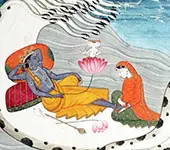Comments
Read more comments
It Is Important to Put Your Strength on Display
अप्रकटीकृतशक्तिः शक्तोऽपि जनस्तिरस्क्रियां लभते
निवसन्नन्तर्दारुणि लंघ्यो वह्निर्न तु ज्वलितः
Whatever skills you have, whatever capabilities you have, whatever strengths you have—it is important that you take efforts to make them known to others. There should be a conscious, planned, systematic effort on your part to display your skill set. Recognition comes only when others know about your skills.
Your humility or modesty need not restrain you from displaying your skills. Your skills, especially when they are for the benefit of others—which most skills are—should be put on display. If you can sing well, it is for the benefit of others. If you can dance well, it is for the benefit of others.
There is no point in being a very good bathroom singer or enjoying your own dance in front of a mirror. Your reward comes when you sing or dance in front of others, and it is recognized and appreciated. Appreciation can trigger a lot of things. Flattery can trigger a lot of things. They can trigger action.
If you look throughout the scriptures, you will see stutis or stotras—they are praises. Whenever someone is in trouble or in need of something, they start praising a particular god or goddess. The god or goddess becomes happy and grants the wish. So, when you get appreciated, it triggers something. Appreciation becomes your motivation to act upon it.
Then you work on your skill, and it improves day by day as you continue working on it. It is the same case when it comes to your strengths as well.
The example given in the verse is that of a piece of wood. There is fire in the wood. Fire is inherent in the wood. When you rub two logs of wood against each other, sparks come out. This is how arani is churned to generate agni for yajnas.
But as long as the wood lies there as a dead log of wood, nobody is bothered. When you see the log of wood ablaze, blazing, then you are careful with it. In the first case, the fire was inside, but you didn’t know about it. In the second case, it is there right in front of you, on display. Now you are careful.
Put your strengths on display; put your contacts on display. Let others know about them. They will act as deterrents. Why do we parade our military strength on Republic Day? It is for the world to see and to keep hostile countries away. They are deterrents.
Whenever there is unrest in an area, like a riot or something, the army conducts what is called a flag march. It is a display of power, showing, 'This is what we are, this is what we have. So better be quiet, or we will use it.' Display, so that you don’t actually have to end up using them.
Let your boss know, let your colleagues know who your contacts are. If you don’t have powerful connections, develop them. That’s how it works. A lot of trouble will be saved.
अप्रकटीकृतशक्तिः शक्तोऽपि जनस्तिरस्क्रियां लभते
निवसन्नन्तर्दारुणि लंघ्यो वह्निर्न तु ज्वलितः
Even the powerful will be ignored if they don’t display their strength. Anybody would walk over a log of wood, but when it is ablaze, no one would.
Only one thing—you need to be careful here. Don’t let it go to your head. If you do, you will end up losing your judgment.
Knowledge Bank
Who was Agastya rishi’s wife?
Lopamudra.
The Divine Origin and Authority of the Vedas
'Dharma' (righteousness) is established by the Vedas, and 'Adharma' (unrighteousness) is its opposite. The Vedas are considered a direct manifestation of Sri Hari, with Bhagavan being the first to proclaim them. Therefore, scholars who understand the Vedas assert that the Vedas embody the essence of Sri Hari. This underscores the belief in the divine origin and authority of the Vedas, highlighting their role in guiding humanity towards righteousness.
Recommended for you
Sri Ramji Defends Vishwamitra's Yaga, Defeating Maricha and Subahu

Sri Ramji’s defense of Vishwamitra’s yaga highlights his divine strength and duty to protect sages and uphold righteousness against the forces of ....
Click here to know more..Why did Sage Valmiki choose Kusha and Lava to be the first recipients of Ramayana?

Chakradhara Stotram

namaste gokulaavaasa namaste gokulapriya. jaya gopavapuh' kri'shna jaya gopeejanapriya.....
Click here to know more..